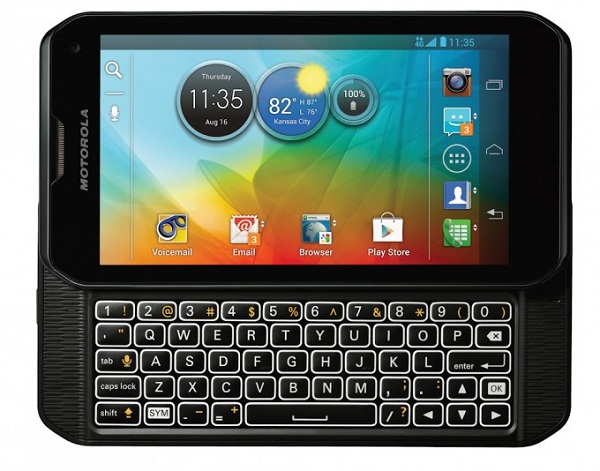Sprint will release the successor to the Motorola Photon in the Photon Q with some key changes in the next few weeks. First is the inclusion of Android Ice Cream Sandwich from the original Photon’s inclusion of Android Gingerbread as well as a 5 row QWERTY keyboard, upgraded 1.5GHz dual-core processor 8.0 megapixel camera with 1080p video capture, microSD slot and HDMI mirroring support.
The Photon Q will include both LTE and world roaming support, although in a rather unsettling move that doesn’t bode well for future Sprint world roaming capable smartphones, both the GSM and LTE SIM cards will be fixed to devices and owners will be unable to remove either SIM card from the Photon Q, which eliminates the possibility of using cheaper local SIM cards for international roaming and will force owners who travel to pay Sprint’s higher roaming rates, setting a bad precedent. Complete specifications are found below:
- 8GB of on board memory, support for up to 32GB SD Card, for a total of up to 40GB
- Bluetooth® 4.0 w/ EDR
- Wi-Fi® b/g/n
- Android™ 4.0.4, Ice Cream Sandwich
- 1.5 GHz dual-core processor
- Rear-facing 8MP camera with 1080p video capture and playback so you can leave your digital camera at home. Plus, those photos can be set to automatically upload to Google+™ so you don’t have to worry about accidently deleting them.
- Front-facing HD camera for easy Google+™ Hangout video chats or conference calls
- Mirror mode when connected with HDMI cable (sold separately) to view images, files and movies on a larger screen, like your TV at home.
- Sprint ID, offering an innovative way to personalize an Android smartphone with apps, widgets, ringtones and more all, in a single download
- NFC support to share links, apps, YouTube™ clips and more with Android™ Beam
In related news, Motorola has confirmed that it will ship the Motorola Photon Q with an unencrypted, but still locked bootloader, which is a slight shift from their previous device policy, which will come as welcome news to the Android modding and hacking community.
Previously, Motorola shipped the majority of their flagship Android smartphones with encrypted and locked bootloaders, which drove away the Android hacking and modding community due to the difficulty in providing custom ROMs for such devices, as the bootloaders in such devices were notoriously difficult to unlock, if they could be unlocked at all. Motorola previously remained silent on providing an official solution to unlock bootloaders on such devices until now.
Motorola also plans to debut their long awaited HTC-alike device bootloader unlocking program with the Photon Q serving as the initial model in the program, but has not revealed a timetable for launch. The same can be said of pricing and availability details for the Photon Q, with those details being revealed in the next few weeks shortly before the phone launches.
